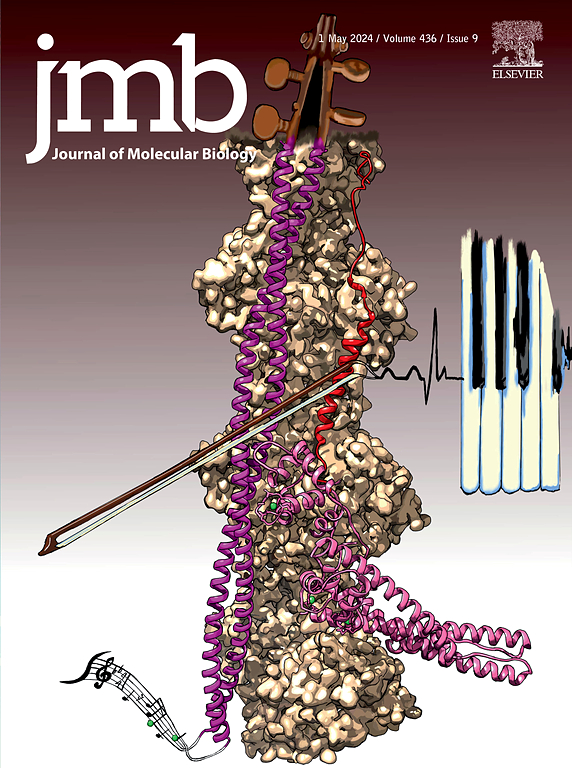Human Plastins are Novel Cytoskeletal pH Sensors with a Reduced F-actin Bundling Capacity at Basic pH
IF 4.5
2区 生物学
Q1 BIOCHEMISTRY & MOLECULAR BIOLOGY
引用次数: 0
Abstract
Intracellular pH (pHi) is a fundamental component of cell homeostasis. Controlled elevations in pHi precede and accompany cell polarization, cytokinesis, and directional migration. pH dysregulation contributes to cancer, neurodegenerative diseases, diabetes, and other metabolic disorders. While cytoskeletal rearrangements are crucial for these processes, only a few cytoskeletal proteins, namely CDC42, cofilin, talin, cortactin, α-actinin, and AIP1 have been documented as pH sensors. Here, we report that actin-bundling proteins plastin 2 (PLS2, aka LCP1) and plastin 3 (PLS3) respond to physiological scale pH fluctuations by a reduced F-actin bundling at alkaline pH. The inhibition of PLS2 actin-bundling activity at elevated pH stems from the reduced affinity of the N-terminal actin-binding domain (ABD1) to actin. In fibroblast cells, elevated cytosolic pH caused the dissociation of ectopically expressed PLS2 and 3 from actin structures, whereas acidic conditions promoted their tighter association with focal adhesions and stress fibers. We identified His207 as one of the pH-sensing residues of PLS2 whose mutation to Lys and Tyr reduces pH sensitivity by enhancing and inhibiting the bundling ability, respectively. Our results suggest that weaker actin bundling by plastin isoforms at alkaline pH favors higher dynamics of the actin cytoskeleton. Therefore, like other cytoskeleton pH sensors, plastins promote disassembly and faster dynamics of cytoskeletal components during cytokinesis and cell migration. Since both plastins are implemented in cancer, their pH sensitivity may contribute to the accelerated proliferation and enhanced invasive and metastatic potentials of cancer cells at alkaline pHi.

人塑蛋白是一种新型的细胞骨架pH传感器,在碱性pH下具有降低的f -肌动蛋白捆绑能力。
细胞内pH值(pHi)是细胞稳态的基本组成部分。在细胞极化、细胞分裂和定向迁移之前,pHi的控制升高伴随着它们。pH值失调会导致癌症、神经退行性疾病、糖尿病和其他代谢紊乱。虽然细胞骨架重排对这些过程至关重要,但只有少数细胞骨架蛋白,即CDC42、cofilin、talin、cortatin、α-actin和AIP1被记录为pH传感器。在这里,我们报道了肌动蛋白结合蛋白plastin 2 (PLS2,又名LCP1)和plastin 3 (PLS3)在碱性pH下通过减少f -肌动蛋白结合来响应生理范围的pH波动。在升高的pH下,PLS2肌动蛋白结合活性的抑制源于n端肌动蛋白结合结构域(ABD1)对肌动蛋白的亲和力降低。在成纤维细胞中,细胞质pH升高导致异位表达的PLS2与肌动蛋白结构分离,而酸性条件则促进其与局灶粘连和应力纤维的紧密联系。我们发现His207是其中一个pH敏感残基,其突变为Lys和Tyr分别通过增强和抑制捆绑能力来降低pH敏感性。我们的研究结果表明,在碱性条件下,较弱的肌动蛋白捆绑有利于肌动蛋白细胞骨架的高动力学。因此,与其他细胞骨架pH传感器一样,在细胞分裂和细胞迁移过程中,质体促进细胞骨架组分的分解和更快的动力学。由于这两种质体都在癌症中发挥作用,它们的pH敏感性可能有助于加速癌细胞在碱性pHi下的增殖,增强癌细胞的侵袭和转移潜力。
本文章由计算机程序翻译,如有差异,请以英文原文为准。
求助全文
约1分钟内获得全文
求助全文
来源期刊

Journal of Molecular Biology
生物-生化与分子生物学
CiteScore
11.30
自引率
1.80%
发文量
412
审稿时长
28 days
期刊介绍:
Journal of Molecular Biology (JMB) provides high quality, comprehensive and broad coverage in all areas of molecular biology. The journal publishes original scientific research papers that provide mechanistic and functional insights and report a significant advance to the field. The journal encourages the submission of multidisciplinary studies that use complementary experimental and computational approaches to address challenging biological questions.
Research areas include but are not limited to: Biomolecular interactions, signaling networks, systems biology; Cell cycle, cell growth, cell differentiation; Cell death, autophagy; Cell signaling and regulation; Chemical biology; Computational biology, in combination with experimental studies; DNA replication, repair, and recombination; Development, regenerative biology, mechanistic and functional studies of stem cells; Epigenetics, chromatin structure and function; Gene expression; Membrane processes, cell surface proteins and cell-cell interactions; Methodological advances, both experimental and theoretical, including databases; Microbiology, virology, and interactions with the host or environment; Microbiota mechanistic and functional studies; Nuclear organization; Post-translational modifications, proteomics; Processing and function of biologically important macromolecules and complexes; Molecular basis of disease; RNA processing, structure and functions of non-coding RNAs, transcription; Sorting, spatiotemporal organization, trafficking; Structural biology; Synthetic biology; Translation, protein folding, chaperones, protein degradation and quality control.
 求助内容:
求助内容: 应助结果提醒方式:
应助结果提醒方式:


